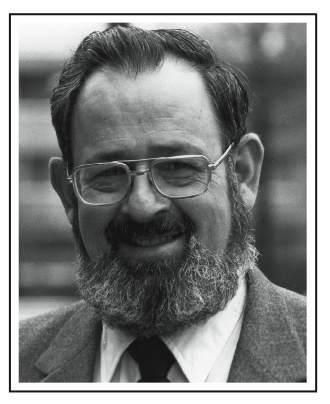 Linus Pauling, 1977.
Linus Pauling, 1977. [Part 7 of 10]
As we have seen, a primary objective of Linus Pauling's work on schizophrenia was to establish the therapy as legitimate and to push it closer toward the mainstream. One opportunity to do so came about in 1977, when the Connecticut state legislature introduced to its docket two bills related to orthomolecular therapy. The legislation, which would add orthomolecular approaches to the roster of standard treatments offered to patients with mental illnesses, marked a unique opportunity for Pauling and others to prod orthomolecular treatments into the mental health mainstream.
On February 17, 1977, Pauling and five other prominent mental health researchers and practitioners, testified before the Public Health and Safety Committee at the Connecticut State Senate, providing their views on two bills that had been proposed: "Bill 5465: An Act to Provide Orthomolecular Therapy to Mental Patients;" and "Bill 5635: An Act Concerning Orthomolecular Therapy." If passed, these two pieces of legislation would add orthomolecular medicine to the standard of care provided to patients at all of Connecticut's state-run mental hospitals.
At the hearing, two factions - one pro and one con - identified themselves rather quickly. Pauling, along with three other people from the pro-orthomolecular camp, offered their testimonies first. And while each person spoke individually, the collective put forth a common core message: that orthomolecular medicine was safe, that the science behind the approach was sound, and that those in opposition were often unfair in their criticism.
In addition to Pauling, three others spoke in support of the bills: Bernard Rimland, Michael Lesser, and Carlton Fredericks. Rimland was a well-known psychologist from San Diego whose main area of research was autism. Lesser was a psychiatrist and president of the California Orthomolecular Society; he also served as the director of the U.S. Navy Drug Rehabilitation Program at the time of the testimony. Fredericks was a public health educator and host of a syndicated radio show where he discussed nutrition education. Two years prior to the hearing, Fredericks had been elected president of the International Academy of Preventative Medicine; he was also a founding member of the Academy of Medical Preventics.
 Bernard Rimland. Credit: International Society for Orthomolecular Medicine
Bernard Rimland. Credit: International Society for Orthomolecular Medicine Among the first points that the speakers pressed was the basic idea that, as Rimland noted, "the use of vitamins and minerals in the treatment of mental disorders is by far the safest, most promising new treatment available." Lesser reinforced this sentiment in adding that, "no one has ever successfully committed suicide using a vitamin substance." Pauling also spoke to the issue, suggesting that "these vitamins - niacin and ascorbic acid, and the other B vitamins, pyridoxine - certainly do not have toxic side-effects, even when taken in large quantities."
From there the speakers turned their attention to what they viewed to be invalid or undue criticism offered by a community of naysayers. Lesser pointed out that much of the negative press surrounding orthomolecular medicine had been drawn from inaccurate sources. Among these were the findings of an American Psychiatric Association task force that had relied on "classical drug research techniques" that, in Lesser's view, "must be rejected as invalid." Bernard Rimland added that
there is an extremely strong opposition on the part of major functions, or major persons of the medical profession, against any kind of nutritional approach toward the treatment or prevention of disease. And I think that the committee ought to be aware that when they have other people testifying, there's going to be what I regard as a very irrational opposition; irrational and uninformed opposition to this form of treatment.
Carlton Fredericks seconded this idea, theorizing that "if we had a proposal to bring a new tranquilizer into your state institutions, there would be no problem, there would be no hearing and there would be no debate, despite the fact that tranquilizers can cause irreversible brain damage, despite the fact that they are at best palliative." Fredericks further pointed out that when Pauling
addressed a subsection of the American Psychiatric Association in the 1960s on the subject of orthomolecular psychiatry, he was booed after he made his remarks. I cite this reluctantly but to separate the point that irrational opposition is more likely to be encountered than anything rational.
As they concluded their remarks, the speakers worked to emphasize the soundness of the science behind orthomolecular medicine. Following comments from Lesser on the seeming demonstration of "great long-term effectiveness" for the orthomolecular approach, Pauling made use of his deep understanding of the past work to argue that orthomolecular techniques had, in fact, been used for a long time. "While advances in medicine are notoriously slow," he offered, "the cultural lag in this particular case is very aggravated, because contrary to what you have heard, orthomolecular psychiatry is not new. The Russians were using a B Complex vitamin in schizophrenia in 1943; it's in their literature."
After the proponents had given their testimony, the opposition had a chance to speak. During the hearing, just two people spoke against the bills, but their point of view was bolstered by several letters of opposition submitted before the hearing, most of them written by organizational representatives. These letters then became a part of the official hearing record, available for use by Senators to help them make their decision. One example letter was written by Richard Kramer, chair of the Connecticut Committee on Mental Health at the Connecticut State Medical Society. In it, he made clear that neither he nor his organization were in favor of the bills passing. In his own letter, the president of the Connecticut Hospital Association, Herbert A. Anderson, also indicated that he, along with "the great majority of psychiatrists do not support" the bills.
The two speakers who offered in-person opposition testimony were Howard Zonana, an associate professor of Psychiatry at Yale University, and Bruce Bower, an internist who worked for Hartford County Medical. Both men offered a similar, bifurcated message: 1) that orthomolecular therapy was dangerous; and 2) that the bills, if passed, would force physicians to kowtow to patients' whims, even if their treatment requests were medically unethical or contraindicated.
In seeking to define orthomolecular medicine as unsafe, Bower argued that,
controversy surrounds this area because of the lack of objective scientific data demonstrating benefit [and] because of the intense anecdotal, but highly emotional basis of its popular appeal. Minimized in this furor are the well-defined results of the hazards of this form of treatment. For example, liver damage has been documented with megavitamin therapy employing nicotinic acid or vitamin B-6. Vitamin D causes elevation of blood calcium, elevation of blood pressure, kidney stones and kidney failure.
Zonana echoed Bower's sentiments and added that vitamin B-3's "toxic effects include jaundice, abnormal liver function, increased uric acid levels, hypotension and dermatological conditions."
From there, the duo painted a portrait of conflicted doctor-patient interactions. If passed, the two claimed, the bills would force mental health practitioners to act unethically, by legally mandating them to use orthomolecular medicine even if it was contraindicated. "There is a dangerous precedent," Bower argued, "which would be introduced into the practice of medicine through any statutory requirement that a physician provide orthomolecular therapy upon the demand of the patient."
Bower further expounded that, "to give an untrained patient the legal ability to require the doctor to give ortho-molecular therapy when, in the physician's professional judgment, it is not called for, creates a potentially counterproductive intervention in the medical management of the patient and other unnecessary point of friction in the delicate balance between the patient and the physician." Zonana reinforced this point, stating his belief "that there is a difference in a patient electing a treatment with informed consent and a treatment being mandated for a population."
Though both the pro and con sides of the hearing were invited to deliver prepared testimonies, Zonana and Bower were offered more time to share their remarks and, importantly, the presiding Senators asked questions of Zonana and Bower, but not of the Pauling group. The tenor and scope of these questions revealed that the Senators were in support of the Bower-Zonana position.
Bower was the first speaker to be questioned. When asked to provide sources for his claims that megavitamins are dangerous, he immediately had a source and a citation ready, noting that it had been retrieved from the "standard pharmaceutical text [...] the bible." Later, another Senator simply asked Bower to comment about vitamins, essentially offering an open invitation to continue speaking without constraint.
A different Senator asked Bower to elaborate on his fear that the bills might force "across the board decisions," including a mandate that physicians prescribe orthomolecular treatments. In his response, Bower stated that not only was he fearful of potential ethical issues, he was also concerned that the legislation would create an environment where necessary testing and procedures would be ignored in order to comply with a legal mandate to pursue orthomolecular therapies. Bower also suggested that baseline tests for vitamin levels "themselves are controversial," which could lead to mismanagement of dosing and further damage to the patient.
Senators approached Zonana in a similar manner and asked him similar types of questions. One of the final questions offered was, "do you, yourself, know of any miraculous cures" such as those touted by "these megavitamins or orthomolecular treatment?"
Zonana's response? A terse and short, no. And the fate of the bills? Perhaps unsurprisingly, they did not become law.
Filed under: Orthomolecular Medicine | Tagged: Bernard Rimland, Bruce Bower, Carlton Frdericks, Howard Zonana, Linus Pauling, Michael Lesser, schizophrenia |
